The Center plans educational projects that redefine EE education in the 21st century. Examples of subjects include entrepreneurship- and innovation-based courses.
Projects
[expand title=”Design of an ACL-Based Course: Introduction to EE” tag=”h3″]
The widespread and growing adoption of active and cooperative learning (ACL) techniques is changing education. Rather than simply attending lectures and taking notes, students spend much of the class period interacting with each other and with the instructor to solve problems relevant to the course’s subject matter. The Electrical Engineering Department at KFUPM has seized the opportunity of the joint collaboration program with Georgia Institute of Technology (GT), and decided to start an ACL-based educational project jointly with GT. The project was to develop and to run one of the EE basic courses, Introduction to Electrical Systems and Computation (EE 206), in ACL format as a pilot for other courses.
The teams have surveyed and examined several alternatives and flavors of running ACL, in an attempt to customize a platform that best achieves KFUPM and GT goals at large and the course objectives in specific. A complete set of documents has been developed to run the course in a productive and engaging manner. Every effort has been made to provide detailed guidance for both students and instructors of the course in all aspects (preparation, delivery, management, and assessment). Part of this material will be used to deliver a training workshop for the course instructors in particular, and for faculty members at large in order to promote transformation to ACL for few other courses.
Working in teams is unquestionably the most effective form of collaboration. Three processes are crucial for the success or failure of teams: Team Formation, Team Management, and Team Assessment. The best practices in these processes have been reviewed and discussed. Jigsaw, a well-structured cooperative learning techniques that is receiving an increasing attention and is proving to be exceptionally effective for learning, has been presented.
The objectives of the developed course were:
1. Emphasize the role of engineering in society.
2. Introduce the various disciplines of electrical engineering.
3. Motivate students towards the profession.
4. Demonstrate basic concept in the context of some widely encountered electrical engineering systems and devices.
5. Introduce skills that are important to industry.
6. Getting hands-on experience with MATLAB.
The course will be divided into four modules: Introducing EE fields, Project I: Research Activity, MATLAB, and Project II: Robotics. The first module of the course is mainly lecture-based and is meant to introduce the student to the different subfields under electrical engineering. This helps the student to comprehend the scope of electrical engineering. The subfields cover Communication, Electromagnetic, Signal Processing, Power, Control, Electronics and Instrumentation.
In the second module students work in teams to conduct simple search. This module aims to develop students’ abilities in the following:
- Learn independently.
- Work effectively in teams.
- Communicate technical information in both written and oral form.
- Plan and execute short term projects.
- Teach others.
- Assess peers professionally and objectively.
The objective of the third module, the programing module, is to introduce EE student to different EE software packages, with emphasize on MATLAB. Students are introduced to the interface environment, language syntax, basic linear algebra operation, and plotting commands with basic application to signal processing.
The fourth module on robotics aims at achieving the following objectives:
- Demonstrate the multidisciplinary nature of real life systems and problems.
- Highlight the engineering approach for problem analysis and solution
- Enhance students’ ability for self-learning.
- Work effectively in teams.
- Plan and execute short term projects.
The following list summarizes what can be achieved with the use of robots:
- Mathematical skills and concepts, such as proportions and ratios, graphing data, and multi-digit computation.
- Apply knowledge of science concepts, such as speed and power, motion and stability, and forces and interactions
- Understand cross-cutting concepts, such as systems, patterns, structure and function, and logical thinking.
- Understand the core concepts of technology.
- Understand the role of troubleshooting, invention and innovation, and experimentation in problem solving.
- Plan and manage activities to develop a solution or complete a project.
In drafting the pilot course material, the teams did every effort to provide the fine details so that instructors feel comfortable with the approach.



Participating faculty and students:
| Name | Title | Affiliation |
|---|---|---|
| Dr. Maan Kousa | Associate Professor | Electrical Engineering Department, KFUPM |
| Dr. Ali Muqaibel | Associate Professor | Electrical Engineering Department, KFUPM |
| Mohammad T. Alkhodary | Graduate Student | Electrical Engineering Department, KFUPM |
| Qadri Mayyala | Graduate Student | Electrical Engineering Department, KFUPM |
| Dr. Douglas Williams | Professor | School of Electrical and Computer Engineering, Georgia Tech |
[/expand]
[expand title=”EE Senior Design Expo at KFUPM” tag=”h3″]
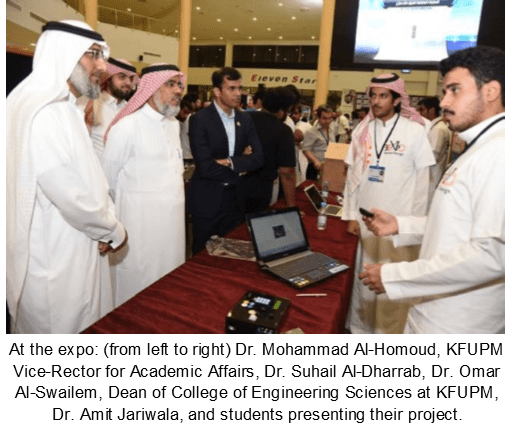
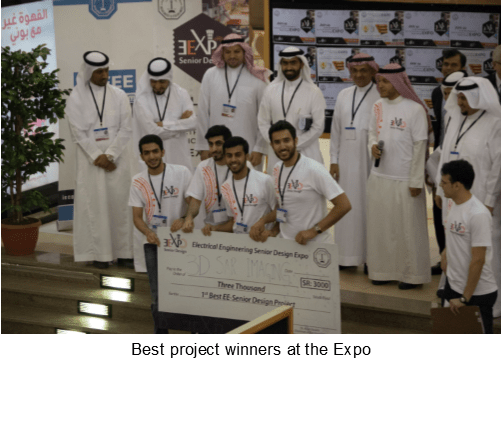
The EE Department of KFUPM hosted its first Senior Design Expo on the 9th of May, 2015 with collaboration and support from Georgia Tech faculty. The Expo was a celebration of all the incredible hard work and dedication put in by the senior graduating students of the EE Department of KFUPM. 97 students in 30 teams from the EE Department participated at the expo and prizes worth over 6000 Saudi Riyals were given out to the top three winning teams. The event marked a historic beginning of an annual tradition of organizing the Expo for the EE Department. The Expo was graced by the presence of Dr. Mohammad Al-Homoud, KFUPM Vice-Rector for Academic Affairs and Dr. Omar Al-Swailem, Dean of College of Engineering Sciences. Over 20 industry experts attended the event and served as judges for the Expo, and they were absolutely thrilled with the level of creativity and talent of the students. The Expo has paved a path for industry to further collaborate with KFUPM and engage more closely with the students and faculty of the EE department of KFUPM.
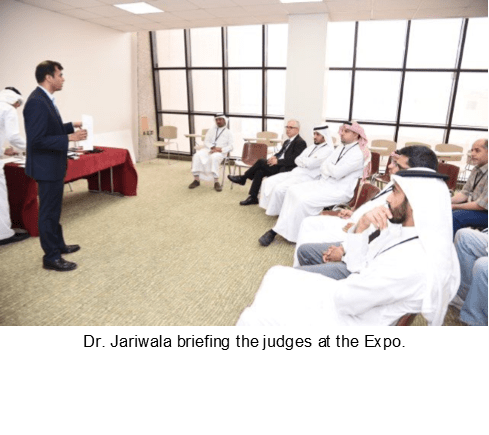
There were numerous factors that led to the successful launch of the Expo and the CeGP collaboration between GT and KFUPM was the cornerstone for all of this. Georgia Tech has had a long standing success in organizing the largest (in the US) bi-annual institute wide Capstone Design Expo with participation of around 150 teams per expo (around 750 students), with over 3000 visitors and numerous corporate partners. Dr. Jariwala, who oversees the planning and execution of the Georgia Tech Capstone Design Expo, was invited by Dr. Ali Al-Shaikhi, the chairman of the EE Department at KFUPM, to present technical talks and provide guidance for organizing the Senior Design Expo. The planning for the expo started several months prior to the event with online discussions between KFUPM faculty and Dr. Jariwala. Throughout the duration of the visit to KFUPM (a few days prior to the expo), Dr. Jariwala met with faculty, students and staff of KFUPM’s EE Department, The Dhahran Techno-Valley Company, and the Dhahran FabLab to share insights about the Expo and i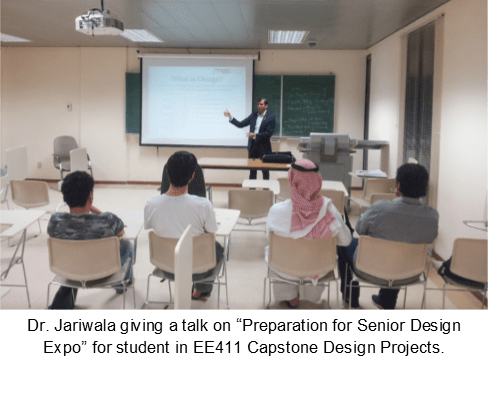 ndustry participation. He attended the KFUPM Career Day to solicit industry sponsors and judges for the Senior Design Expo. The EE Student Club of KFUPM played a pivotal role in the execution of the event under the leadership of their faculty advisor, Mohammad AlMuhaini. Several faculty and staff members within the EE department of KFUPM under the leadership of Dr. Ali Al-Shaiki worked tirelessly to put the event together. The CeGP leadership thanks the support and coordination provided by Mohammad Tamim Alkhodary for his selfless service to the collaboration in helping to enable creative educational experiments through the CeGP project. The Expo has sent a message within KFUPM to celebrate student success and inspire more creative industry engagement with the university. This foundation will be built upon further with the development of a joint Design Education Project under CeGP which would be mutually beneficial to both Georgia Tech and KFUPM students and faculty.
ndustry participation. He attended the KFUPM Career Day to solicit industry sponsors and judges for the Senior Design Expo. The EE Student Club of KFUPM played a pivotal role in the execution of the event under the leadership of their faculty advisor, Mohammad AlMuhaini. Several faculty and staff members within the EE department of KFUPM under the leadership of Dr. Ali Al-Shaiki worked tirelessly to put the event together. The CeGP leadership thanks the support and coordination provided by Mohammad Tamim Alkhodary for his selfless service to the collaboration in helping to enable creative educational experiments through the CeGP project. The Expo has sent a message within KFUPM to celebrate student success and inspire more creative industry engagement with the university. This foundation will be built upon further with the development of a joint Design Education Project under CeGP which would be mutually beneficial to both Georgia Tech and KFUPM students and faculty.
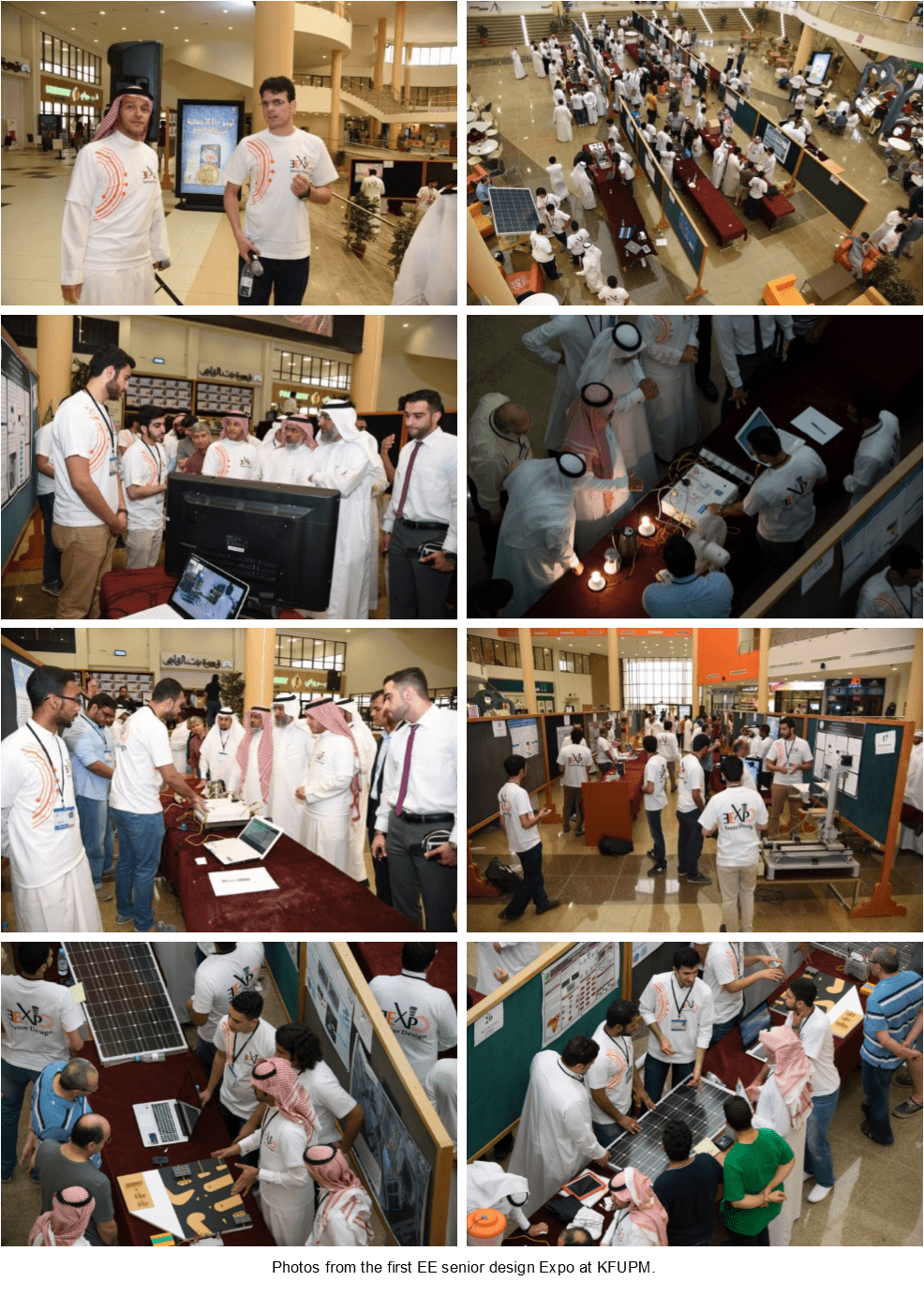
[/expand]
[expand title=”Global Research Experience for the Undergraduate Students (GREU)” tag=”h3″]
In summer 2015, Professor Ali Muqaibel spent two months on the Georgia Tech campus. One of the activities he focused on was to learn how Georgia Tech organizes activities on research for undergraduate students. He met with several UG students who are doing research and he met with their graduate students mentors and faculty advisors. As an outcome of the visit, Professor Muqaibel and Professor AlRegib put together a plan to create a global research experience for UG students. This plan works in multiple phases. In the first phase (2016), KFUPM develops a course on UG research, where a small group of students enroll and experience this for the first time at KFUPM. In the process, faculty, graduate students, and undergraduate students provide suggestions, guidelines and feedback on the process. This transfer of knowledge has been very helpful to the KFUPM team as they start the experience in early 2016. In the second phase, the plan is to engage students from both campuses (~5 or less from each side) to conduct research collaboratively on problems that are of a global scale.
Below are some photos from the activities that have taken place so far and we are very excited about the prospect to take this to a global scale in late 2016 and in 2017.
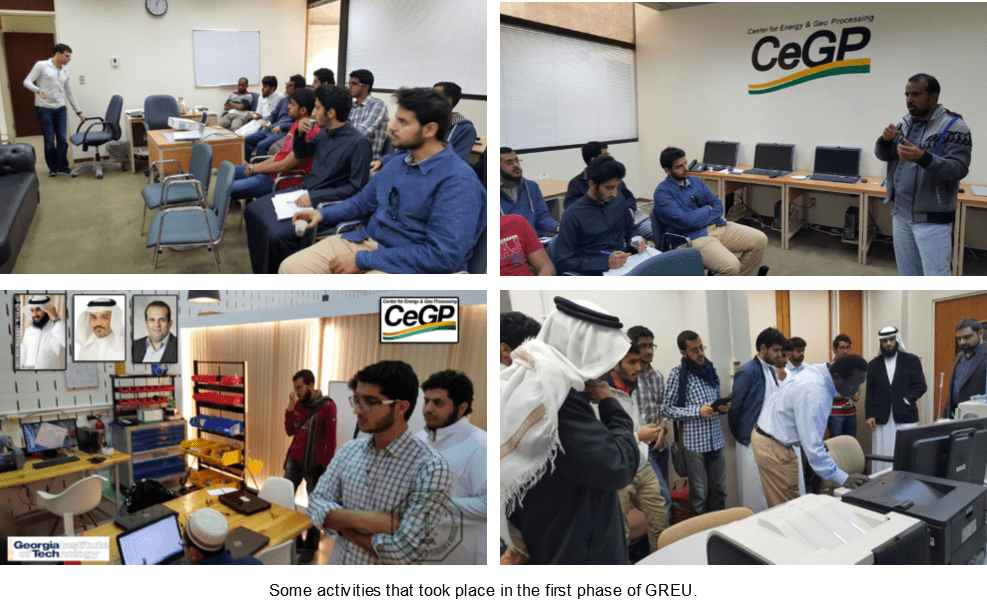
[/expand]

